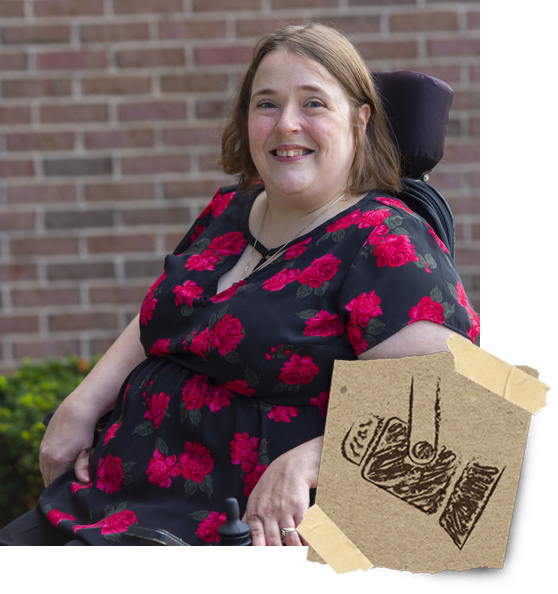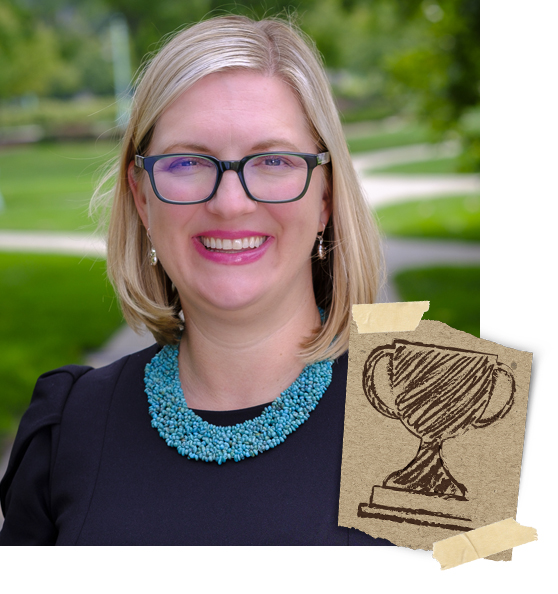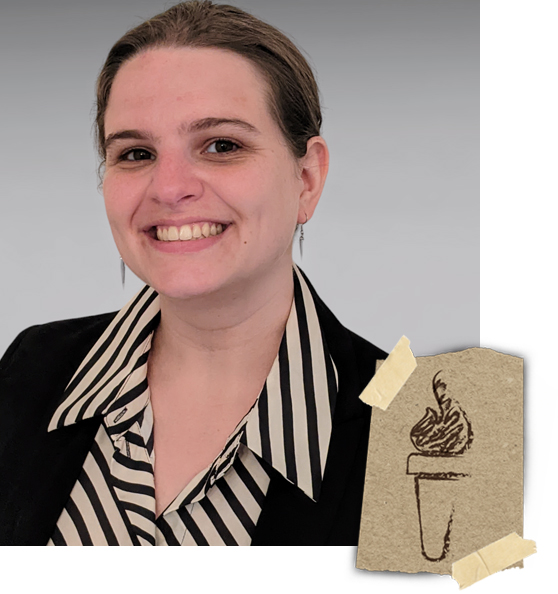Diversity Spotlight: Laura Hall
July 23, 2024 - Emily Jodway
 This July, we celebrate Disability Independence Day and the strides that have been made toward increased opportunities and inclusion for individuals with disabilities. The Americans with Disabilities Act was signed on July 26 of 1990, and guaranteed access to equal opportunities and services while protecting against employment discrimination for those individuals. Laura Hall, an alumna of the Colleges of Education and Social Science, has spent her life and career advocating for those with disabilities, both visible and invisible. As someone with cerebral palsy, she personally sees the importance of disability pride and treating people with any type of disability with respect. She is our Diversity Spotlight for the month of July.
This July, we celebrate Disability Independence Day and the strides that have been made toward increased opportunities and inclusion for individuals with disabilities. The Americans with Disabilities Act was signed on July 26 of 1990, and guaranteed access to equal opportunities and services while protecting against employment discrimination for those individuals. Laura Hall, an alumna of the Colleges of Education and Social Science, has spent her life and career advocating for those with disabilities, both visible and invisible. As someone with cerebral palsy, she personally sees the importance of disability pride and treating people with any type of disability with respect. She is our Diversity Spotlight for the month of July.
Hall grew up in the Jackson area, in a small town where diversity and accessibility was often hard to find. This greatly motivated her to pursue an education at Michigan State, a school in a city not too far from home but one where she knew she would find more people like herself. Growing up in the 1990s, the Americans with Disabilities Act had just recently been passed and strides were beginning to be made toward increased accessibility, though change was slow to take effect in a small town. Hall remembers her school installing a wheelchair lift for getting upstairs rather than an elevator in order to save money.
“I definitely knew at the time that I was different, and that it made life a little harder, but I don’t think that I really thought about all the barriers and where they came from, and that it was an injustice, until I was older,” she said.
At Michigan State, Hall did find other students with disabilities and a disabled community to participate in, both socially and in the name of advocacy. It was the first time she was able to view her disability in a different light; not as a burden or hindrance but as a part of who she is and what makes her unique.
“I think it was the first time I saw myself as having disability pride, meaning that I wasn’t ashamed of who I was,” she explained. “The problem isn’t disability, it’s the barriers in society, and for the first time I had people reminding me of that. It led me to a different way of thinking about my disability, and about advocacy and what I wanted to do.”
With her passions ignited, Hall pursued her bachelor’s degree in education and, after taking a year off, earned a master’s degree from the School of Social Work. In addition to finding a community of similar individuals at Michigan State, she began to find her voice and the courage to express concerns over accessibility issues on college campuses. Facing some of these issues firsthand served as another reminder to Hall of the work to be done within the disabled community.
“It got me thinking about how people with disabilities are only employed at 30 percent rather than 70 percent like the general population, and the disparities in health care, education … there’s so much work to be done in every area, and it’s daunting, but it’s also exciting to me.”
After college, Hall spent time in the educational sphere and taught first-grade students. For the past 12 years, she has been working for the Michigan Disability Assistive Technology Program as an Assistive Technology Specialist, and is Director of the Leaders for Inclusion (LFI) program. Hall works with assistive technology specialists who help individuals with disabilities use speech to text programs and incorporate home automation to control things around the house with their voice, via things like Amazon Alexa or Google Home. These technologies can make life much easier for those who struggle with tasks that involve typing, pressing buttons, or activating things within the home that may be hard to reach.
“People get so excited when the technology works for them,” Hall said. “The other day I was showing someone how to use a smart plug, and she was able to turn her lights on for the first time by herself, and she just roared with laughter. She was so excited about it. It was a really exciting moment for me, too.”
With YELL, a young adult leadership program, Hall works with youths with intellectual or developmental disabilities aged 18 to 26. Hall and the Michigan Disability Rights Coalition helps to provide them with the tools and training needed to develop leadership and advocacy skills, and makes connections within the community to form potential leadership opportunities. They also put on retreats where the group gets together for activities and education on topics like disability history, disability pride, ableism and social justice. Hall particularly enjoys getting to know the kids and seeing them become advocates for both themselves and each other, opening up and gaining the confidence to speak out about injustices.
“This younger population that they work with, once they get the advocacy bug I think they’re more willing to speak out about things that are injustices,” she explained. “I really like seeing them come in and they don’t think that they’re leaders, but they are already, we just kind of help them hone those leadership skills.”
Aside from celebrations Hall participates in during the lead-up to Disability Independence Day with the Michigan Disability Rights Coalition as part of her job, she enjoys going out in the community and reflecting on her time being a part of local activist groups who engage in nonviolent direct action in order to create change around the disability rights movement.
“I like to think back on my time when I was protesting and doing things like that, and I like to think about how far we’ve come and how far we still need to go,” she said.
“I think everyone adjusting to their disability and developing Disability Pride is on a different journey, but I think all disabilities are of equal importance and should be treated as equal. But I think we need to think about disability beyond disability; we’re also people of color, we can be part of the LGBTQ+ community, and can be oppressed in different ways. We need to look at the whole person, and as a community, be concerned with these other issues because they are all impacting our community. We need to come together as communities, and we can be more powerful that way.”
Read more:

Diversity Champion
Faculty/Staff
Dr. Sarah Douglas
Sarah Douglas is an Associate Professor in Human Development and Family Studies and Director of the MSU Research in Autism and Developmental Disabilities (RADD) Lab. She began her career as a special education teacher for children with disabilities before joining MSU as faculty in 2014.

Diversity Torch
Student
Livy Drexler
Livy Drexler is an anthropology PhD candidate at MSU with a focus in medical anthropology. A former special education student and an older sibling to two autistic brothers, Drexler is interested in cultural competency in special education programs that serve Native American students, cultural constructions of disability, and community based participatory action research.

Diversity Matters
We strive to cultivate an inclusive and welcoming college environment that celebrates a diversity of people, ideas, and perspectives.

